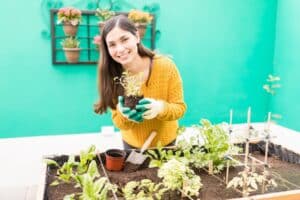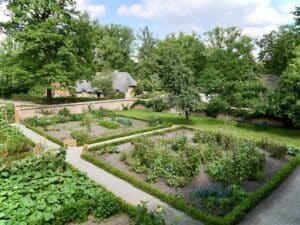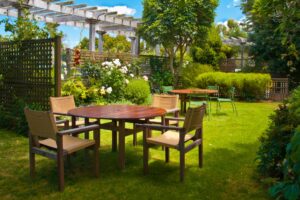The Top 9 Things to Know about Gardens

We love gardens here at Diacos, and we want to share that love. So we thought we’d ask our helpful team of gardeners for 9 of their favourite gardening facts to share with you.
You’ll find plenty of in-depth gardening guides all through our Gardening Advice section, so we’ve tried not to get too technical with these ones. Instead, we’ve focused on what makes gardens so great.
You’ll still find plenty of helpful little gardening tips in here though, so read on for more!
1. Anyone can garden! It doesn’t have to be intimidating.
Many people are intimidated by the idea of gardening, either because they think it will be too much work, or because they’ve killed off a few plants in the past! Yet those particular plants may have been fussy, hard to care for, or simply not a good fit for their environment.
Many plants are sturdy and low-maintenance, so it’s always worth trying again with a plant or garden that’s better suited to your lifestyle. Your garden doesn’t have to be large and unmanageable either. Remember – you’re the one in charge. Work within your comfort zone and work with what you’ve got, and you’ll find a beautiful garden springing up in no time.
Even large gardens can be made more manageable. Try working on small sections one at a time, and laying plastic or tarp over sections you haven’t gotten to yet to prevent them from running wild in the meantime. Plants tend to need less care once they reach a healthy stage of growth, so working on your garden in bite-sized chunks can end up being a lot easier!
Want some more garden inspiration? Check out our article on Ways to Make Your Garden Look Amazing.
2. Gardens are super good for your health
People have been tending to gardens for thousands of years. Part of the reason that we’ve been at it so long is that gardening is just so, so good for us.
Studies have proved time and time again the benefits of gardening, and of spending time around plants and nature in general. And you don’t have to grow a personal jungle before you feel the effects -just getting your hands into the dirt makes a difference!
Scientists have found that contact with the microorganisms in soil has a positive effect on human gut health. Furthermore, being around plants has been shown to calm the mind, reduce stress and aid concentration. And that’s not even mentioning all the exercise you get! We’ve written even more about the 7 Health Benefits of Gardening here on our blog.
We really love plant science here at Diacos – our knowledgeable staff could go on for hours if you let them! But there’s something decidedly unscientific about our love for plants, too. At the end of the day, the joy that comes from caring for a garden and watching it grow is just good for the soul. It’s as simple as that.
3. A garden can increase your property value. Yes, really.
Everyone has different motivators in life. If all this talk of good feelings and health benefits has you rolling your eyes and hovering over the ‘back’ button, bear with us – especially if you’re a homeowner.
Growing a garden can net you some serious real-world financial benefits. Studies have shown that growing a well-cared-for outdoor garden on your property can add up to 16% in value – that’s a lot of zeroes for some flowers and trees!
People really treasure gardens. They’re a special space for us to relax and connect with nature. So it’s not surprising that this translates into real-world value for homeowners. Just one more reason to consider starting a garden!
4. Gardens will attract little friends to help the ecosystem.
Cold, hard real estate cash isn’t the only thing that your new garden will be attracting. Gardens also help the natural ecosystem, attracting plenty of little friends that help our natural environment stay healthy and flourish.
Don’t worry, we don’t mean pests like rats and spiders. Instead, most gardens will attract a much more pleasant crowd, like bees, butterflies and native birds. Pollinators like bees are particularly vital to garden ecosystems.
These fuzzy little guys help all the plants on earth reproduce, and their populations have been struggling lately. Do your part for the environment by planting some pollen-producing flowers and making your garden a great place for bees to be.
5. Gardens are a great way to use your compost waste.
Food waste is a part of many households, and many of us simply throw it in the trash with everything else. But this organic matter – veggie scraps, egg shells, fruit peels etc. – can provide excellent nutrients for your plants.
Keep a compost bin in your kitchen to collect your organic scraps, and your garden is sure to love you for it. You can invest in a composter if you like, but it’s not actually necessary.
Simply bury your scraps, coffee grounds and eggshells a few inches below the surface in the area of your choice, and their nutrients will begin to feed your soil and plants as the compost decomposes. That’s all there is to it, and it’s much better than throwing these scraps into landfills.
Got more garden space than food waste? Don’t worry. You can purchase bags of premium garden compost here at Diacos.
6. Veggie Gardens can change your life for the better.
We know we’ve already talked about the many benefits of gardening, but we wanted to zero in a little more on the joys of the humble veggie garden. Veggie gardens have one big draw compared to every other type of garden, and you already know what it is: Delicious food!
It’s hard to understate the difference that growing your own food can make to your life. It will remake your understanding of food and cooking, and eventually save you some serious money on your grocery bills. Being self-sustainable, even in a small way, is immensely rewarding.
We recommend that most people start small, and just plant one or two seasonal veggies that you love to eat. If you find you’re enjoying it – then plant more, and more again! You may find that you have a self-sustainable food supply before you know it.
Check out our Guide to Growing a Veggie Garden for more!
7. Growing a garden will reduce your carbon footprint.
We’ve already talked a lot about how gardens can change your life. But they’re also helping change the life of everybody on earth, by helping to turn back the clock on global warming.
Our warming climate is caused by carbon dioxide becoming trapped in our atmosphere. But as part of their photosynthesis process, plants remove carbon dioxide from the air and turn it into nutrients to feed their growth. You may already know this – it’s partly why tree-planting and re-foresting efforts have become so popular.
This means that every tree, shrub, grass or flower that you plant in your garden helps make the planet a better place for the future. If you really want to minimise your carbon footprint as much as possible, take some inspiration from the above tips – composting and growing your own food.
Studies have shown that these two gardening activities make the biggest difference to our carbon footprint, by completely eliminating the heavy emissions that are produced by transporting fresh vegetables to the supermarket and taking your food waste to landfills.
8. Keep a garden notebook. It’ll help a lot!
Whether you’re new to gardening or a well-practised pro, we think that one of the best things you could ever do for your garden is to keep a garden notebook.
As we’re fond of saying, learning to garden is all about natural trial and error. It takes time to learn the specific needs of your plants and respond to them. Keeping track of changes and plant responses in your notebook can make this whole process a lot clearer and easy to manage
You can also use your notebook to plan out your garden layout, and to make sure all of your plants will be okay if you’re making a change. Gardening is all about working with your garden, not against it, and keeping a notebook is one of the most helpful tools you have for doing so.
9. Weeds are a fact of life. But prevention is the best solution.
Every gardener has to deal with weeds. They’re a persistent nuisance, with some weeds posing more of a threat than others. Mention ‘Mother of Millions’ or ‘Pattersons Curse’ around a farmer or experienced gardener and you’ll likely cop a long, bitter earful!
But weeds can be dealt with, and like most things in life, prevention is the best cure. Mulching with cardboard, newspaper or old carpet fabric is a popular way of choking out weeds before they grow. Cutting off the heads of certain weeds before they can spread their seeds – or ‘deadheading’ them – is another solid way to severely limit their spread.
Sooner or later, though, a weed will get through. You can use Weed Killer, though you should check how this may affect different parts of your garden ecosystem first. Pouring boiling water on weeds is another foolproof, natural way to kill the pesky things. Weeds can be a pain, but with the right attitude and a good strategy, they’re totally manageable.
Gardens are an incredibly fulfilling space to care for and spend time in. And they’re good for the planet, too. We’re passionate gardeners here at Diacos, and we want to spread the good word about gardening far and wide.
These have been the top 9 things we think everyone should know about gardens. Hopefully, it can inspire you to get out in your own garden and have a go! Check out our online garden store to start growing today.
-
 13, Jun, 2025
13, Jun, 2025How to Start a Garden Design Project: Step-by-Step Planning Guide for Beginners
At Diaco’s, we know that creating a beautiful garden starts... -
 27, May, 2025
27, May, 2025Smart Garden Layout Ideas: How to Maximise Your Outdoor Space
At Diaco’s, we believe every garden has potential. Whether you’ve... -
 9, May, 2025
9, May, 20257 Garden Design Principles to Transform Your Outdoor Space
At Diaco’s, we know that creating a garden isn’t just...


